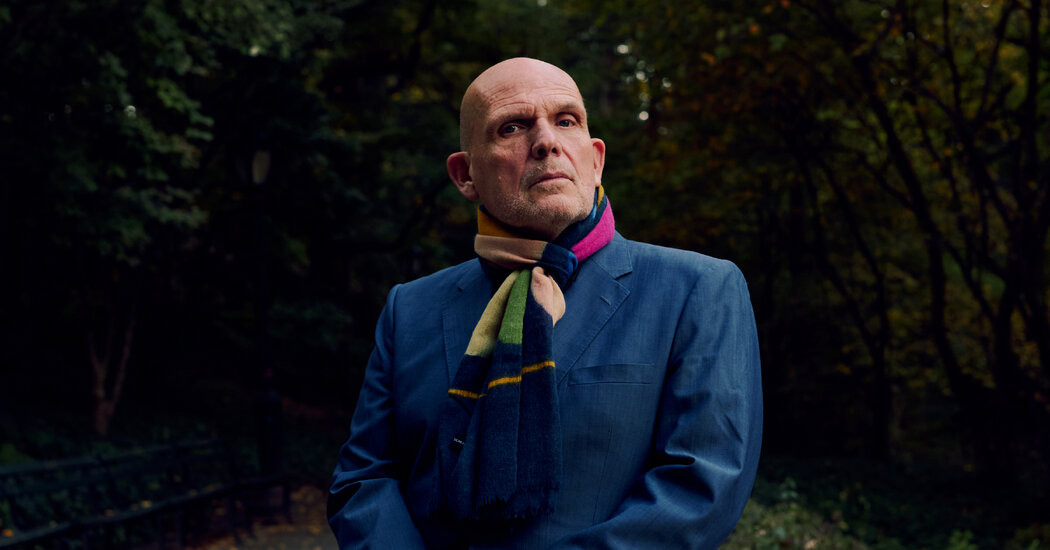Jaap van Zweden stood in front of the Seoul Philharmonic Orchestra in a rehearsal studio on West 37th Street last Saturday, conducting Rachmaninoff’s Second Symphony. Van Zweden and his orchestra had arrived from South Korea the day before, and were recovering from jet lag. When the final notes of the symphony sounded, he put down his baton and looked across the crowded basement practice hall.
“Too much viola,” he said. A slight chill fell across the room. He paused, and a smile broke out across the face of this 64-year-old Dutch conductor who has never been known for smiling. “But the rest — bravissimo!” The orchestra responded with applause and squeals of delight. The string players tapped their bows on music stands in appreciation.
In 2024, van Zweden left his post as the music director of the New York Philharmonic after a somber and truncated six-year tenure shadowed by the coronavirus pandemic, which left the Philharmonic almost entirely offstage for 18 months and deferred some of the most ambitious plans he had for the highest-profile job of his career.
Now the conductor everyone calls Jaap (pronounced “Yahp”) is returning to New York for the first time since he left the Philharmonic to conduct the Seoul Philharmonic, which he now leads, at Carnegie Hall on Monday night. It will be an opportunity for van Zweden’s former audience to see what he has done with this latest chapter of his life.
Van Zweden spent nearly the entire pandemic lockdown, in 2020 and ’21, at his home in Amsterdam. He lost nearly 35 pounds. He also discovered — to the surprise of no one who knows him as a resolutely old school violin prodigy — that Zoom was not for him. As the pandemic rolled on day after day, distancing him ever further from the New York Philharmonic about 3,600 miles away, he began contemplating an early retirement to spend more time with his wife, children and grandchildren.
He told the Philharmonic in 2021 that he would step down. And when he departed last year, he became the orchestra’s shortest-serving music director since Pierre Boulez, who led it for six seasons in the 1970s.
“These years were so incredibly bumpy because of everything that happened,” he said. “It was a perfect way, actually, to say goodbye on a very high note.”
He said he was planning at the time to slow down. “And then I started to realize that slowing down — you know in Chinese they say when you retire young, you die young,” he said. “So I thought: ‘Well, let’s go. Let’s go to where I belong — on the stage.’”
The result? Van Zweden spent just three weeks at home last year.
He became the music director in Seoul last year; the artist-in-residence at the Evergreen Symphony Orchestra, an orchestra founded by the charitable arm of a Taiwanese shipping company; and served as a guest conductor for orchestras in Cleveland, Chicago and San Francisco, where he opened the San Francisco Symphony’s season. He commissioned a piece, “Inferno,” from Jung Jae-il, who composed the soundtracks for “Parasite” and “Squid Game.” (Van Zweden will conduct its U.S. premiere at Carnegie.)
Next year, he will take on additional responsibilities, becoming the music director at the Orchestre Philharmonique de Radio France. He will also return to the New York Philharmonic with a guest appearance in 2028.
Beyond his conducting engagements, van Zweden has been working — by his account and others — to ease the severe European style that he previously brought to the podium, and that seemed like a relic from another era. This transformation began after orchestra members described him to Pointer, an investigative journalism program produced by Dutch public broadcaster KRO-NCRV, as authoritarian and dictatorial to the point of being emotionally abusive.
Van Zweden has never disputed those characterizations. But during an interview, he suggested that he had been caught in the gears of a generational shift, and that he had struggled to adjust to working with younger players who had little tolerance for the traditional, stern father-figure conductors (almost always a man) of past eras, who would throw players out of rehearsals for being out-of-tune or out of practice.
“I think for some, I can be exacting,” he said. “Could I have been less fanatical? Yes, a little bit.” He was quick to add that fanatical — like the time he had an orchestra play the opening notes of Beethoven’s Fifth Symphony (the famous “duh-duh-duh-DUH”) 15 times in practice because the brasses were lagging — accounted for his success in transforming ensembles like the Hong Kong Philharmonic Orchestra and the Dallas Symphony Orchestra.
“It’s not what you say — it’s how you say it,” he said. “You can say very tough things with a smile on your face.”
Jung Jae-wal, the chief executive of the Seoul Philharmonic, said: “No related matters have come to light within the organization. I had a conversation with maestro van Zweden about this, and — as always — I will continue to pay close attention to the orchestra’s environment and operations to help maintain the integrity of our institution.”
Deborah Borda, the former president and chief executive of the New York Philharmonic, who recruited van Zweden to come to New York, disputed the idea that he was abusive.
“I think what people perceive as gruffness is that he’s very direct,” she said “He is very Dutch. And the Dutch are known for being very direct. Some people find that difficult to deal with. I didn’t. He told you what he was thinking.”
Borda says that van Zweden is known as “an orchestra builder,” and that “when he was brought to Seoul, it was for that reason” — to raise the quality of what had been viewed as a competent if undistinguished orchestra.
Van Zweden’s years leading Dallas, from 2008 to 2018, are also often held up as an example of an ability to raise the performance level of an orchestra. But it was not always applauded. “He dramatically improved the D.S.O., although at the cost of a lot of tension with the musicians, some of whom were genuinely traumatized,” said Scott Cantrell, the former music critic for the Dallas Morning News.
The years in New York were a dark period for van Zweden. But it now seems clear that he left a mark, if more administrative than musical. He lured Borda from her post as the chief executive of the Los Angeles Philharmonic to run the New York Philharmonic — which paved the way for Borda to bring Gustavo Dudamel, the conductor she has long admired and championed, from Los Angeles to New York as music director. He also hired 23 musicians.
When the orchestra prepared to move back into David Geffen Hall, after a transformative renovation, van Zweden spent months perfecting its acoustics, conducting practices with the Philharmonic as he instructed players to move their seats or technicians to adjust the baffling panels.
“He has left a legacy,” said Adam Crane, the orchestra’s vice president of external affairs. “He was there when the hall was being opened.”
Van Zweden said he had spoken with Dudamel, and predicted that he would feed off the energy of New York (in a way, it often seemed, that van Zweden did not). “He will absolutely enjoy his time here,” van Zweden said, “and the orchestra will absolutely be enjoying him.”
He suggested that New York would prove different from Dudamel’s experience in Los Angeles. “It’s not the same,” van Zweden said. “Because next door is Carnegie Hall. They get great orchestras, orchestras that prepare when they come to Carnegie Hall.”
And, van Zweden said, even after Geffen Hall’s renovation, it still doesn’t measure up to the acoustics of Walt Disney Concert Hall. “To be honest, it is slightly better,” he said of Disney. The sound at Geffen, he added, is drier, and “you can’t hear each other on the stage.”
Van Zweden flashed a smile when asked whether he thought Dudamel would find New York — with Carnegie Hall up the street, discriminating audiences and difficult music critics — more challenging than Los Angeles.
“You should ask him that in a few years,” he said. “I would say yes, but why don’t you ask him to talk about that for himself.”
Adam Nagourney is a Times reporter covering cultural, government and political stories in New York and California.
The post A Conductor Returns to New York After His Unhappy Philharmonic Tenure appeared first on New York Times.




